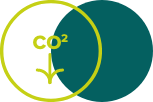Our vision is a world Purely Driven by clean energy
Our mission is to help our world transition to a low-carbon future by accelerating the production of renewable gases.
Our mission is to help our world transition to a low-carbon future by accelerating the production of renewable gases.
A sustainable development model that integrates economic growth with social and environmental responsibility is what we all need to work towards at Ivys.
Today, we are providing clean technology solutions that deliver low-carbon renewable gases, and we strive to do so as efficiently as possible, in keeping with the resources available to us.

The issue of climate change is core to Ivys’s mission of helping our world transition to a low-carbon future by accelerating the production of renewable gases. Our business strategy is to meet the growing market demand for energy-efficient and low-emission sources of energy, to service new customers and maintain strong growth in revenues and operating profitability. Our operating and financial performance are predicated on leveraging policy and technology developments, such as low carbon or renewable fuel standards that facilitate the development of low-carbon solutions, such as renewable natural gas and hydrogen. We intend to be a facilitator in the rapidly evolving global energy transition space.

Energy is an input in industrial product manufacturing, stemming mainly from electricity consumption and fuel purchases, so managing how our energy is sourced and how much we consume is part of controlling costs as well as any potential impacts from regulations or taxes on fossil fuels.

More than 30% of employees work in manufacturing, at our facilities. They face health and safety risks from exposure to machinery and equipment. This is especially the case for welding activities and manipulating very large and heavy metal components. Employee safety is a priority at Ivys, and we continuously conduct health and safety meetings and improvement actions.

Emissions in use phase is an important characteristic of our cleantech products, to meet customers’ evolving needs and cost imperatives. It serves as an important competitive differentiator and allows us not only to capture the growing demand for gas purification and renewable gas production systems but also to capture a growing share of the market. Given the relatively high fixed cost nature of our business, higher growth and revenues can quickly translate to higher profitability.

While we design all our products, our manufacturing activities mainly involve the assembly of gas purification units using components and materials procured from third parties. In this regard, we are dependent on a few suppliers and if they become unable or unwilling to provide us with enough materials and components that meet our quality, quantity, cost, and delivery requirements, we may be unable to obtain suitable substitute materials and components from other suppliers, which would adversely affect our revenue generation and profit margins.

The remanufacturing of equipment and components may offer opportunities to reduce costs by reducing raw material purchases, generate new revenue streams and strengthen customer relationships by better meeting their need for parts, as well as helping them divert resources from disposal or recycling channels.
Over the years, we have invested heavily in research and development to develop technologies that deliver cost-effective, low-impact solutions for the generation and purification of renewable natural gas and hydrogen.
The increasing awareness of climate-related risks and the global movement to transition to a low-carbon economy is providing us with opportunities to generate tangible economic value.

The recognition of climate change as a global systemic risk, driving a transition from fossil energy sources towards renewable, zero-carbon energy.

Continued build-out of clean natural gas refueling infrastructure in the U.S., Canada, and Europe combined with rapidly increasing demand for renewable natural gas as a transportation fuel.

Implementation of low-carbon fuel standards driving demand for renewable natural gas and hydrogen as a low-carbon transportation fuel and establishment of renewable natural gas assets.

Increasing demand for small-scale decentralized hydrogen production and purification solutions for fuel cell applications in transportation and industrial applications.

Hydrogen purification technologies poised to experience robust growth in the U.S., China, Japan, Canada, Germany, and India in refining and electronics industries.

Increasing demand for compressed air and gas equipment across the food & beverage, medical and pharmaceutical industries that can deliver cleaner, purer, oil-free, dry and sterile compressed air, combined with the trend in reshoring industries to North America
We are industry leaders in maintaining the most up-to-date accreditations covering everything from ISO certifications to various pressure vessel codes. Our team of dedicated professionals ensures that all certifications are current and compliant with customer product requirements.